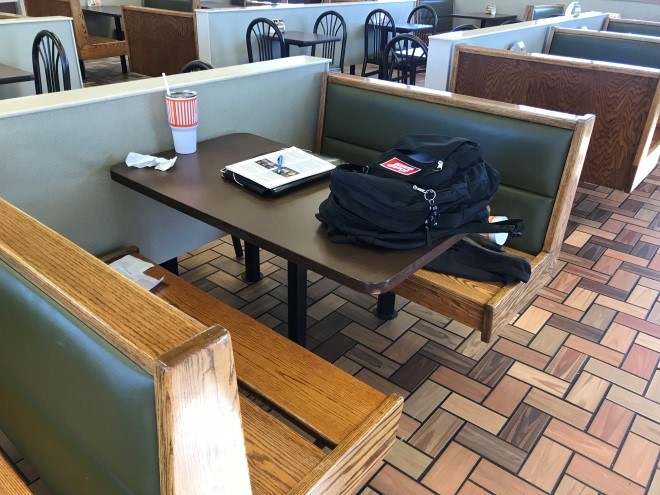Giving a Blessing
/I have been reading Genesis 27, preparing for Sunday’s Bible Class, and realized how little I understand about giving blessings. My study reminded me of a piece I wrote in June 2001. Here is an updated version.
Have you ever given a blessing? Ever received a blessing from someone? I don’t mean a beautiful song or a poignant essay or a great sermon. I mean a physical blessing. Henri Nouwen wrote about giving blessings to people he ministered to, and in his case the blessings always involved touching.
In the Baptist churches where I grew up I don’t remember anyone “giving out blessings”. I’m pretty sure we weren’t against it – we certainly cared about each other and tried to be a blessing in our service – but I don’t remember that particular terminology.
Maybe that’s what we were doing when we ordained someone into the ministry by laying our hands on their head and praying. Or on those occasions when we commissioned a mission group by surrounding them and praying for them; that might be the closest I remember to giving a personal blessing.
I don’t know which part of a blessing is the most important, words or touch, but I do know the power of touch is unforgettable. Several years ago I was in a Dennis Jernigan concert in Midland Center when he asked people who were hurting to stand and then asked believers nearby to stand with them and put their hands on them and pray. I know this has been a part of worship for a long time, but the addition of touch was new to me. I had spent many prayer sessions praying for other people, but the power of touching while we prayed was new. (I am always the last to figure things out.)
Sometimes in church we all stand up and hold hands to pray, but that doesn’t have the same sense of “blessing.” I’ll participate, but I seldom feel blessed. I figure we have to hold hands a couple of times each month so all the touch-feely folks won’t leave our church. (That sounds pretty cold, doesn’t it?) Holding hands while we sing or pray has never been especially meaningful to me. Don’t get me wrong, it doesn’t make me nervous and I don’t dread holding hands; in fact, I love to go along with any form of worship that helps me to know God better … but the truth is, the only hand I am interested in holding is Cyndi’s. (And, to be completely honest, I have often left the room when I feel a handholding session boiling up.)
One Wednesday evening several years ago our pastor, Randall Everett, in a combined Ash Wednesday service with First Presbyterian Church, drew a cross on my forehead with ashes. It was my first experience with that, and I loved it. No, I was deeply moved by the feel of his touch on my skin. Of course, he later told me he intended to draw an X on me, instead of a cross, but he realized the Presbyterians were watching. I didn’t mind. Even the joke felt personal and close.
Nouwen wrote about a time when a young woman under his ministry asked him for a blessing. He was taken back by her request and reached out to her and traced with his thumb the signs of the cross on her forehead. She said, “No, that doesn’t work, I want a real blessing!”
He was wearing a long white robe with giant billowing sleeves, so when he stretched out his arms the woman ran to him and put her head on his chest. He covered her with his huge sleeves and held her and said, “Janet, I want you to know that you are God’s Beloved Daughter. You are precious in God’s eyes. Your beautiful smile, your kindness to the people in your house and all the good things you do show us what a beautiful human being you are. I know you feel a little low these days and that there is some sadness in your heart, but I want you to remember who you are – a very special person, deeply loved by God and all the people who are here with you.”
Wow. Reading that makes me want to find a Henri Nouwen, move in close, and say, “Me too! Bless me too!” I might become a touch-feely guy myself if that’s how it went.
We often substitute affirmations for blessings. That isn’t what Nouwen was doing. The reason we are valuable is the love of God within us; it isn’t our worthiness but His worthiness, and being blessed means being reminded of that worthiness. There was more in Nouwen’s blessing than the silly personal self-affirmations of our modern self-help world.
I’m not sure what to do about this. I don’t know how we can bless each other. We can certainly encourage one another, and pray for each other, and show the love of God to each other. And OK, maybe hug and hold hands.
I am fully aware how we bless each other with our teaching, our music, our service, our lives … but what Henri Nouwen did seems to be a completely different category.
I want to learn how to give blessings and how to receive blessings. I think it’s something I ought to be doing. We are communal creatures and we were created to experience the love of God together.
May God bless you.
“You have made us for Yourself, and our heart is restless until it rests in You.” … Augustine




















